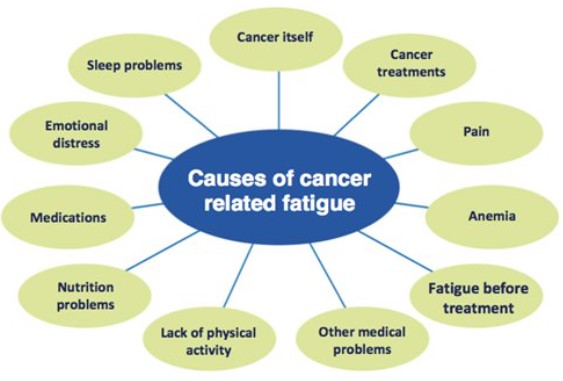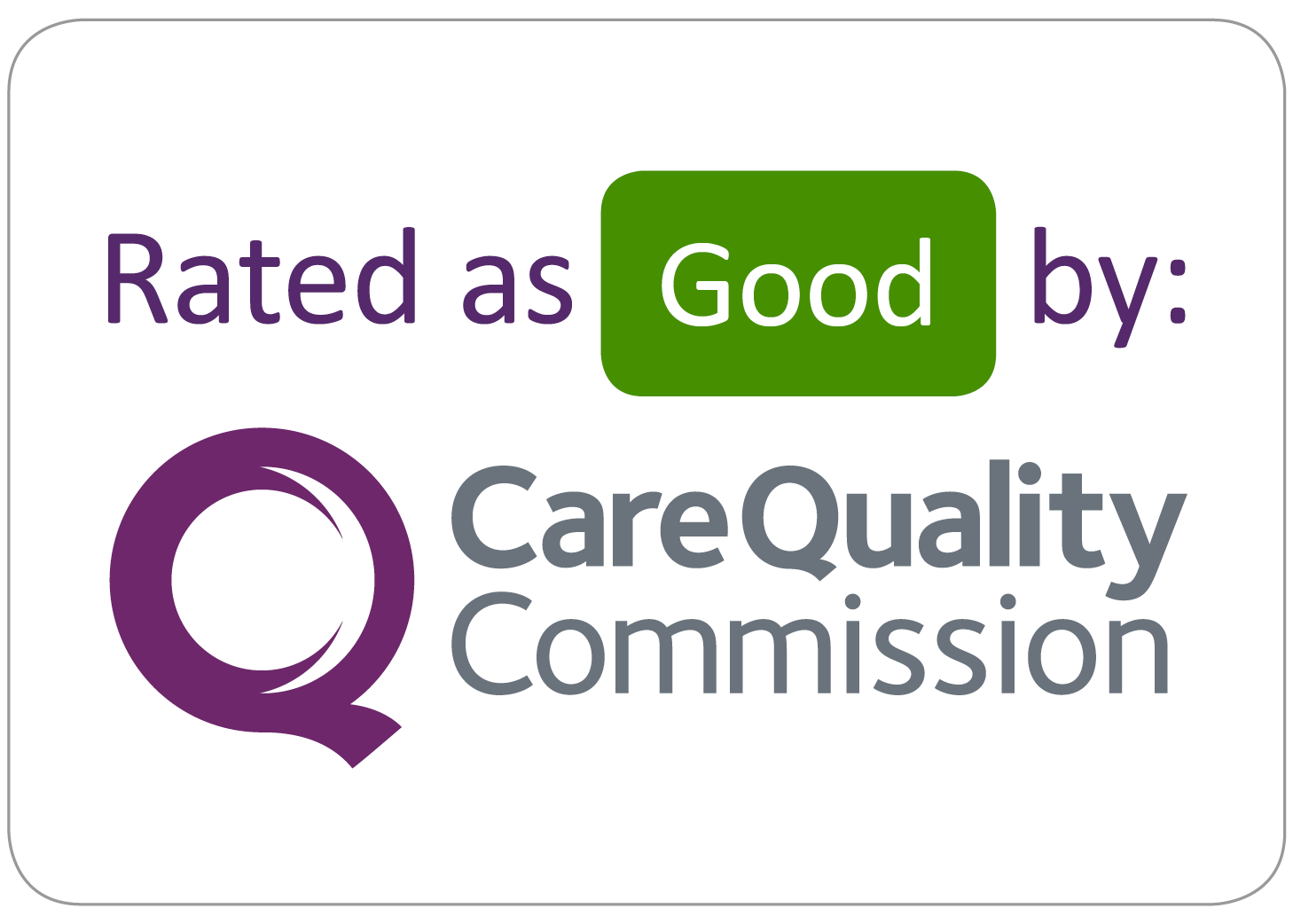Fatigue
Fatigue is a feeling of tiredness or exhaustion. It's a common problem for people with cancer and many people with cancer may feel fatigued at some time and this is called cancer-related fatigue. It may be caused by the cancer itself, the symptoms associated with cancer or a side effect of treatment.
The following videos demonstrate fatigue from two different patient's perspectives. Denton, Ruth and Faye describe what struggling with fatigue meant to them and how they managed to combat the effects to regain their function and quality of life.
It can be difficult to deal with when you are already trying to cope with a cancer and you may feel very tired or exhausted all or most of the time.
Cancer related fatigue is different from the tiredness that someone without cancer may get. People with cancer may get tired more quickly after less activity. Their fatigue may not be helped by rest or sleep. For most people, fatigue gets better after treatment finishes. But for some it may continue for months or sometimes years. Everyone is different and there is no way to know how long fatigue may last for each person.
It is important to tell the health care professionals you are involved with about your fatigue and how it makes you feel. There may be things they can do to help.
Effects of Fatigue
Some of the more common effects of fatigue include:
• difficulty doing simple things, such as brushing your hair or getting dressed
• feeling you have no energy or strength
• difficulty concentrating and remembering things
• difficulty thinking, speaking or making decisions
• feeling breathless after light activity
• feeling dizzy or lightheaded
• difficulty sleeping (insomnia)
• losing interest in sex
• feeling low in mood and more emotional than usual.
Having one or more of these effects can affect your daily activities or social life. For example, finding it hard to concentrate may affect your work or studies. Fatigue can also affect your relationships. You may need to rest more, meaning you might spend less time with friends and family or you may avoid going out or being with friends because it makes you very tired.
Causes of fatigue

The cancer itself
This might be because of the symptoms of cancer. For example, parts of your body may be swollen because the cancer has caused a build-up of fluid. This can make them feel heavy and it can be difficult to move around. Cancers that cause changes in hormone levels, such as breast or prostate cancer, may cause fatigue. Cancer may also affect the levels of cytokines in the body. Cytokines are a type of protein made in the body. They help control some of the things that cells do. Studies show that cytokine levels can be higher in people with cancer-related fatigue than in people without it. This may cause some symptoms such as tiredness.
Cancer treatments
It is thought that fatigue may happen after having cancer treatment because; the body needs extra energy to repair and heal, there is a build-up of chemicals as the cancer cells are destroyed, the body’s immune system is affected.
Surgery - Many people feel tired after surgery and need to avoid doing too much for a while. This effect does not usually last long. However, some types of surgery may cause continuing problems with fatigue. For example, surgery to the stomach may cause problems with absorbing food. Not being able to absorb nutrients from food can affect your energy levels.
Chemotherapy - is the use of anti-cancer (cytotoxic) drugs to destroy cancer cells. It is often given in cycles a few weeks apart. Some people feel most fatigued in the first few days after chemotherapy. They then find it gets better for a while before the next cycle. The fatigue may increase with each treatment.
Radiotherapy - is the use of high-energy rays to destroy cancer cells. Often, people feel more fatigued as the treatment goes on. Fatigue caused by chemotherapy or radiotherapy usually improves after treatment, but sometimes it can become a long-term problem.
Hormone therapy – these can stop or slow down the growth of some cancer cells and some reduce the levels of particular hormones in the body. Other types prevent the hormones being absorbed by cancer cells. This therapy is often given for several years and can cause fatigue.
Targeted (biological) therapy - uses substances that target the growth of cancer cells and these can cause fatigue.
Anaemia
You may feel tired because the cancer has reduced the number of red blood cells. Red blood cells are made in your bone marrow. They contain haemoglobin which carries oxygen to cells. If the haemoglobin level goes down and cells are not getting enough oxygen, you are likely to feel very tired.
Eating problems
Our bodies get energy from the food we eat. Fatigue can happen if the body does not get enough food, or if there are changes to the way the body is able to use the food. If you have cancer, this can happen because:
- you cannot eat the same amount of food as you normally would
- your body needs more energy than it did before
- your body may not be able to absorb and use all the nutrients from the food.
You may lose weight even if you are eating a lot, because of the effect of the cancer on the body.
If you feel sick (nausea), you may eat less. This could mean that you do not get enough energy from food. If you are sick (vomit), your body does not absorb the food and its nutrients.
This can make you feel weak and tired, and you may also become dehydrated.
If you have nausea or vomiting, your doctor can prescribe anti-sickness (anti-emetic) drugs, which usually help. Some anti-sickness drugs can cause tiredness and may make you feel drowsy. However, it is important to keep taking them. Let your doctor know if this is a problem.
Chemotherapy can cause changes in appetite and taste, which may cause you to eat less. There are things you can try that may help with this. Your doctor, nurse or hospital dietitian may be able to help. You may find that you use all your energy cooking and then feel too tired to eat.
Psychological effects of cancer
Fatigue can be made worse by; anxiety, depression, stress and tension, a poor sleeping paattern. It is common for people to have anxiety or depression when they are first diagnosed with cancer. However, these feelings generally get easier to manage as you come to terms with what has happened. You may find it helpful to discuss how you feel with your partner, a family member or close friend. Some people find it helpful to talk to other people at a local support group, or join an internet support group
Loss of muscle strength (deconditioning)
If you have fatigue, you may become less active over time. When your muscles are not being used regularly, they become weaker. Having weak muscles means you will find it very difficult and tiring to do even simple tasks. It may also mean you are more at risk of falling over. It is understandable that you may not want to do very much when you are dealing with cancer and its treatment. But staying active is the best way to keep your muscle strength and build up your energy. You could start by sitting up in a chair rather than lying down in bed while you are recovering. Gradually build up to walking short distances around the house. Support is available to increase your levels of physical activity and strength safely.
Managing Fatigue
How fatigue is managed depends on what is causing it. It is important to talk about fatigue with your healthcare team. There may be ways to improve it. Your doctor will check for any causes of fatigue that can be treated, such as anaemia. They may examine you and you may have some blood tests. They may also look at the medicines you are taking. This is to check whether they can make changes to them that might improve fatigue. For example, they may reduce the dose of a tablet that makes you sleepy.
Physical Activity
There is good evidence that physical activity can help reduce the symptoms of fatigue. Being active can help boost your appetite, give you more energy and improve sleep.
If you have not been very active in the past or for a long time, it is best to start slowly. Try to get a balance between being active and getting some rest. Choose an activity or exercise that you enjoy, as you are more likely to keep doing it. If you have fatigue, being active may not always be possible but remember that some exercise is always better than no exercise. It might help to set some simple goals. This could be walking from the front door to the back door. But try to do a little more activity each time, if you can. Before you start doing any physical activity or increase the amount you do, it is important to get advice and support from a healthcare professional.
Your cancer doctor, specialist nurse, GP, physiotherapist, personal trainer who specialises in supporting people affected by cancer can advise you on the type and amount of activity that is safe for you to do. It’s also important to mention any other medical conditions you have, such as high blood pressure, diabetes or lung problems. These may be affected by physical activity but activity can be modified to suit you.
Setting realistic goals to keep you active and manage any side effects of treatment is a good start and support is available to do this. Support in setting an exercise programme can help.
Many people find socialising with other people in a group enjoyable. Exercising as part of a group can also help you to stay motivated.
Tips for keeping active –
- Do not exercise if you feel unwell, are in pain or have any other symptoms that worry you, such as feeling breathless. If you feel unwell or have worrying symptoms, let your doctor know.
- It is helpful to set yourself some simple achievable goals. Try not to do too much too soon.
- Plan some activity into your day. For example, walk to the shops instead of driving, if you can.
- Try some regular, light exercise, such as walking, and simple strengthening exercises.
- Do something you enjoy, such as gardening.
Healthy diet and weight
Eating well and keeping to a healthy weight can help you maintain or regain your strength. It can also give you more energy. Eating a healthy diet and keeping to a healthy weight reduces the risk of heart problems, diabetes and developing some cancers.
It can help to keep a diary of what and when you eat – this can help you see if you have more energy after certain meals. Drink plenty of fluids. Try different foods or eat foods that taste best to you if you have taste changes, until things improve.
Sleep
Even though your fatigue may make you feel like sleeping all the time, try to keep to a normal sleep routine. Good-quality sleep may help with fatigue, as well as reduce your need to sleep during the day. Tips for a better night’s sleep are; going to bed and get up at about the same time every day. Try not to sleep late into the day after a sleepless night, as this can lead to a disrupted sleep pattern. Try to do gentle exercise like walking, as this can help you feel naturally tired and ready for sleep. Keep your mind occupied with activities like reading, games or puzzles. This can also help you feel naturally ready to sleep. Be aware of how naps affect you. Some people find that daytime naps help them sleep better at night, while others sleep less well after them.
Complementary therapies
There are different complementary therapies that may help with
fatigue, such as; relaxation, massage therapy and yoga. Many people feel that complementary therapies are supportive and can help you feel more in control of your health. Some complementary therapies have been researched. But for other therapies, the evidence is based on people’s personal accounts (anecdotal) rather than on facts. Some of these therapies may be available on the NHS.
You may also be able to get them through a cancer support group. If you find a complementary therapist, make sure that they are properly qualified and registered. Before you use a complementary therapy, talk to your specialist doctor or nurse. Some therapies may affect your cancer treatment.
Emotional support
Dealing with fatigue all the time can be very difficult. Some people find it can affect their feelings. If you are finding it difficult to cope, it can help to talk to someone close to you, such as a family member or friend or you may prefer to talk to someone in your healthcare team.
Counsellors - If you feel anxious or depressed, you may find counselling helpful. Counsellors are trained to listen. They can help you deal with difficult emotions. Many hospitals have counsellors or staff who are specially trained to provide emotional support to people affected by cancer.
Not all counselling services are available on the NHS.
Support groups - Some people find it helps to talk to other people with fatigue. You may find talking to other people at the hospital helpful, or you could join a local support group. See the Macmillan Information Service page to see the details of cancer support groups available here. They are supported and facilitated at times by the Macmillan information service staff and other members of the group may be in a similar position to you. Some people find groups helpful and make close relationships with other members and often find peer support very beneficial.
Online support - Many people get support on the internet. Online support groups for people affected by cancer include; social networking sites, forums, chat rooms and blogs. You can use these to share your experience. You can also ask questions, and get and give advice based on your experience.
Macmillan Online Community is a social networking site where you can talk to people, write blogs, make friends and join support groups. Visit www.macmillan.org.uk/community
Planning Ahead
If you have fatigue, planning ahead can help. You could try planning your day so that you have energy to do the things you want to do most. It may help to think about whether there are any activities you are prepared to stop for a while, until you can do them again. Writing down your energy levels will help you see the days and times when you have more energy. But you may not be able to do everything you used to do. You can use a fatigue diary to keep a record of your fatigue. Write down the times when you feel your best and when you feel most tired. This may help you to plan your activities.
Try to plan bigger tasks to fit in with the time of day when you feel least tired. Pace yourself, and plan enough rest and sleep periods. Plan a rest after activities. Some people also find that they need to rest after meals. Short naps and rests can help, but try to balance them with some activity or exercise. Too much inactivity may lead to your muscles becoming weaker which can make your fatigue worse. It is important that any rest during the day does not stop you from sleeping at night. It is also important to plan around your treatment. Try to avoid anything energetic or stressful for 24 hours before and after your treatments. If you feel less well one day, it is okay to be less active and to rest more.
Additional information

Untire App – To help and support people affected by cancer related fatigue
More information can be found on their webdsite please click the link
If you have have a question for the First Steps team please submit it on the form below
Please note, if your question needs an urgent response you should contact your clinical team directly.
The First Steps team aim to respond to your question within a few days. Please bear in mind the information team's working days are Monday to Friday. Any questions submitted may be used anonymously as part of the frequently asked question section of the First Steps website.

















